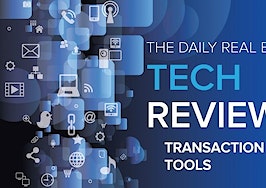Never has so much good software been available to so many in our industry. It seems that a new crop of innovators hits the pages of this publication each day, but there’s one industry player not feeling the full effect of this trend — the broker.
Although entrepreneurs and developers accelerate their innovation for agents, brokers — particularly larger ones — are still stuck with dated legacy technology.
There are some exceptions, of course. Yapmo offers brokers a novel intranet solution. Dotloop now has an excellent brokerage product.
But these are the exceptions. While agents at any given brokerage sample from a plenitude of new tools, their companies pick through crumbs.
At the same time, brokerages locked into old technology platforms fall further behind the portals in terms of delivering excellent consumer-facing technology, management functionality and agent tools.
This dynamic has produced what I call a brokerage technology deficit — an accumulated shortfall in the capacity of most real estate companies to innovate.
Why?
There are a few things going on here.
First, many entrepreneurs looking at the residential real estate industry get fooled when sizing up the market opportunity. They see that there are 2 million real estate agents and 1 million Realtors and think, “If I only grab 10 percent of that number, I’ll have a great business.” This compares favorably to, say, winning over 10 percent of the Real Trends 500.
Of course, we all know agent numbers are a mirage (thanks to the 80/20 rule), but I see this error made over and over again. There’s no agent technology with even 10 percent of all agents paying monthly. This market just doesn’t work that way.
Second, legacy technology lock-in has a lot of brokers in a vise-grip — or so they think. Many are hesitant to switch from a vendor with whom their agents are familiar and from which they have extracted significant customizations. Bad software has a way of keeping users right where they are simply by holding the incumbent position.
Third, brokers’ data is trapped. Integration with legacy platforms is often far too difficult.
So let’s say you’re an entrepreneur who builds a fantastic application for managing brokerage advertising. You present it to several companies, and they love it. But you sign no contracts because what you’ve built needs to be integrated with the brokerages’ existing systems, which are likely to be old, lacking well-documented APIs (or APIs at all — more on this below), and maintained by folks less than eager to do yet another customization. Platforms should be data hubs, not data jails.
I could go on. But you get the point. It’s hard for brokers to adopt new technologies, and it’s hard for technology vendors to serve them.
Deficit reduction
As the founder of a technology company focused on helping brokerages become more efficient and profitable, I naturally think this is a solvable problem.
We are gaining traction, as are a few others, but we need a few things to happen to reduce the deficit.
All software companies serving the brokerage community, new and old, need to accelerate their development of APIs that allow their applications to work with other applications.
We do this at Boston Logic, and it makes everyone’s life a lot easier. This acceleration is how software works in 2015, and the industry needs to catch up. Brokers need to expect this from their vendors.
More fundamentally, many legacy software vendors need to escape the limitations of their aging code.
If you’re managing millions of lines of code accumulated over 15 years that’s written in an archaic language, it’s very hard, if not impossible, to innovate on behalf of your clients. Starting over might be better than compounding this problem. Many vendors need to reboot.
I also believe technology is undervalued in the minds of many brokers. It’s viewed as a cost center because so much of the available technology can’t be clearly tied to profit. A cycle of low expectations — thinking they already spend a lot of money just to keep agents from leaving — means brokers grind down prices, and vendors can’t invest in improving their products.
I am hoping to change this. Brokers deserve better.
David Friedman is the founder and president of Boston Logic. You can follow him on Twitter or LinkedIn.
Inman Connect San Francisco is right around the corner — register now and save $200!







